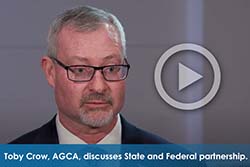March 18, 2021
Innovation of the Month:
Strategic Workforce Development
Last week, we looked deeper into the "Identify, Train, Place" playbook, which highlights eight areas or "plays" to help your agency locate and hire workers to fill vacant highway construction jobs. Now, we will look at some of the key industry partners that can support your agency in the training and placement process.
The Associated General Contractors of America (AGC) and American Road & Transportation Builders Association (ARTBA) were two of the original partners in the strategic workforce development (SWD) initiative, also known as the Highway Construction Workforce Partnership (HCWP), and have been key to its success. AGC and ARTBA represent highway contractors, who build the majority of the road and bridge projects and who are depended on by FHWA and State DOTs to deliver the Nation's highway program. AGC and ARTBA have chapters in most States and serve as a link between the HCWP and the contractor workforce.

During a two-year multi-state pilot, these partner organizations, among others, identified workforce requirements in terms of occupations and skills needed and capacity; and how many workers were needed in various occupations. Once these needs were defined, the SWD partnership organizations aligned that need with training programs through community colleges, trade and technical schools, and other training providers. The contractor community through AGC, ARTBA and other partner organizations helped complete the process by placing trained individuals into highway construction jobs. The partnership helped build a skilled highway construction workforce, provided a pathway for rewarding careers in highway construction, and provided the best return on investment for the taxpayer dollar.
Arizona served as one pilot location for the SWD initiative, with AGC leading the effort. AGC brought industry to the table with its connection to individual construction firms, engaged all sectors, and created an environment where the State DOT, Workforce Board, and contracting industry could jointly collaborate on innovative approaches to identifying potential workforce candidates, training, and placing them onto highway construction projects. Their involvement set the stage for the organization to continue to be actively engaged in Arizona's effort beyond the end of the pilot time frame. Learn more about AZ's work with AGC in the SWD playbook—Play 1: Let Industry Quarterback Your Team.
To learn more about the strategic workforce development initiative and how you can engage with AGC, ARTBA and other partner organizations to locate and hire workers, please contact Karen Bobo or Clark Martin, FHWA Office of Innovative Program Delivery Center for Transportation Workforce Development, or Joe Conway, FHWA Office of Innovative Program Delivery Center for Local Aid Support. Find the AGC and ARTBA chapters in your area.
EDC Outtakes—Strategic Workforce Development
EDC Outtakes—a series of short interview videos—give insight into the current round of EDC innovations from State practitioners and FHWA personnel. In our latest edition, Toby Crow with the Associated General Contractors of America, South Dakota, discusses the significance of the Strategic Workforce Development initiative's partnership between State and Federal agencies, trade organizations, and private industry.
Keep reading EDC News for future editions of EDC Outtakes!
Pile Driving—An e-Construction Paradigm Shift
In the United States, over 100,000 piles are driven annually for various transportation construction projects. Driving a pile correctly is critical to the health, integrity and longevity of the structure.
Current pile driving practices feature several pain points for inspection and quality. Surrounding noise, quickly moving piles, instrument sensitivity, real-time cross referencing and translating data from field to DOT compliant logs all contribute to challenges for pile driving inspection and quality.
Paper-based pile driving records have been used for decades, but more effective and efficient practices to collect and track pile driving are becoming readily available. State DOTs are improving processes and procedures using the dozens of e-Construction tools and technologies available. In 2020, the Florida Department of Transportation (FDOT) updated its pile driving inspection and information recording guidelines by incorporating a commercial, off-the-shelf e-Construction pile inspection device, SmartPile Inspector, that collects, analyses, displays, and electronically stores the data from every hammer blow. The device auto-generates State DOT required pile driving records, exports a non-editable electronic data file, and uses real-time dashboards for integrated Artificial Intelligence, analytics, reports, notifications, and alerts.
Using electronic or digital processes simplifies handling and integration of pile driving data into construction management or document management systems for acceptance, payment, and source documentation helps States reap the benefits of the efficiency and transparency of e-Construction.
To learn more about this technology or other e-Construction methods, please contact Kathryn Weisner with the FHWA Construction and Project Management Team.
The U.S. Government does not endorse products or manufacturers. Trademarks or manufacturers' names appear in this presentation only because they are considered essential to the objective of the presentation. They are included for informational purposes only and are not intended to reflect a preference, approval, or endorsement of any one product or entity.
Stay Up to Date on the EDC Innovations That Interest You Most
EDC teams are always on the move! If you blink, you could miss out on important webinars, case studies, tools, videos, and more. To never miss information for the EDC innovations that interest you most, visit the subscription page and select the topics you'd like to receive updates on directly from the teams that coordinate them.
This week, we're featuring a recent update from the EDC-6 NextGen TIM team. The update detailed the team's upcoming March 24 webinar that will focus on the American Association of State Highway and Transportation Officials' (AASHTO) role in traffic incident management, Nebraska's temporary traffic control program, fire truck attenuators for temporary traffic control, and new legislation in Massachusetts for driver and responder safety.
Additionally, the Center for Local Aid Support (CLAS) recently released its March 2021 newsletter. This Center works with many groups that also support EDC innovations, such as Local Technical Assistance Programs (LTAPs) and Tribal Technical Assistance Program (TTAP) and hosts the annual "Build a Better Mousetrap" competition, as well as hosting events and providing many e-learning training options for individual professional development. Read the newsletter and subscribe to stay informed on what's going on with CLAS.
About EDC
Every Day Counts, a State-based program of the Federal Highway Administration’s Center for Accelerating Innovation, works with State, local, and private sector partners to encourage the adoption of proven technologies and innovations to shorten and enhance project delivery.



